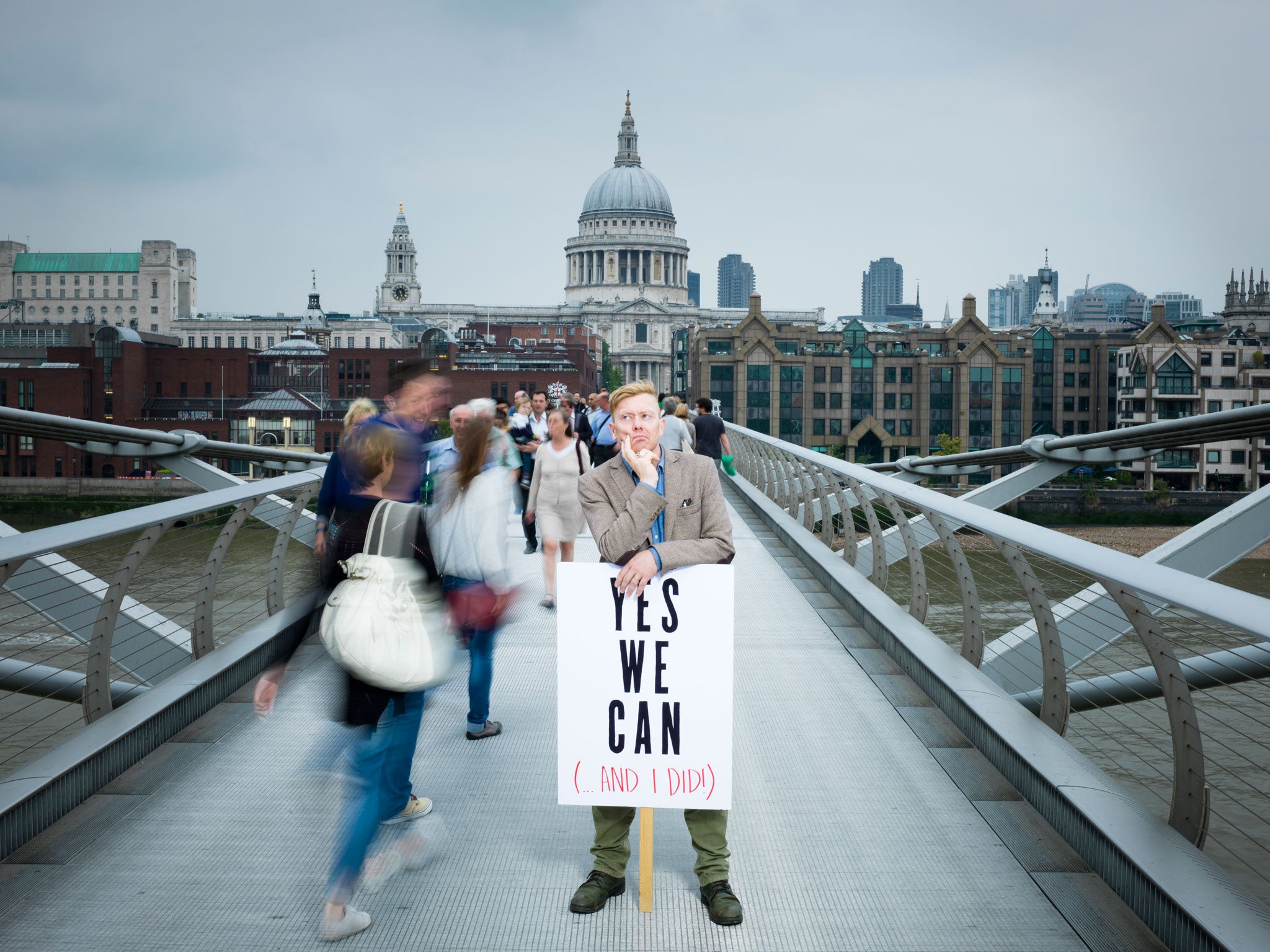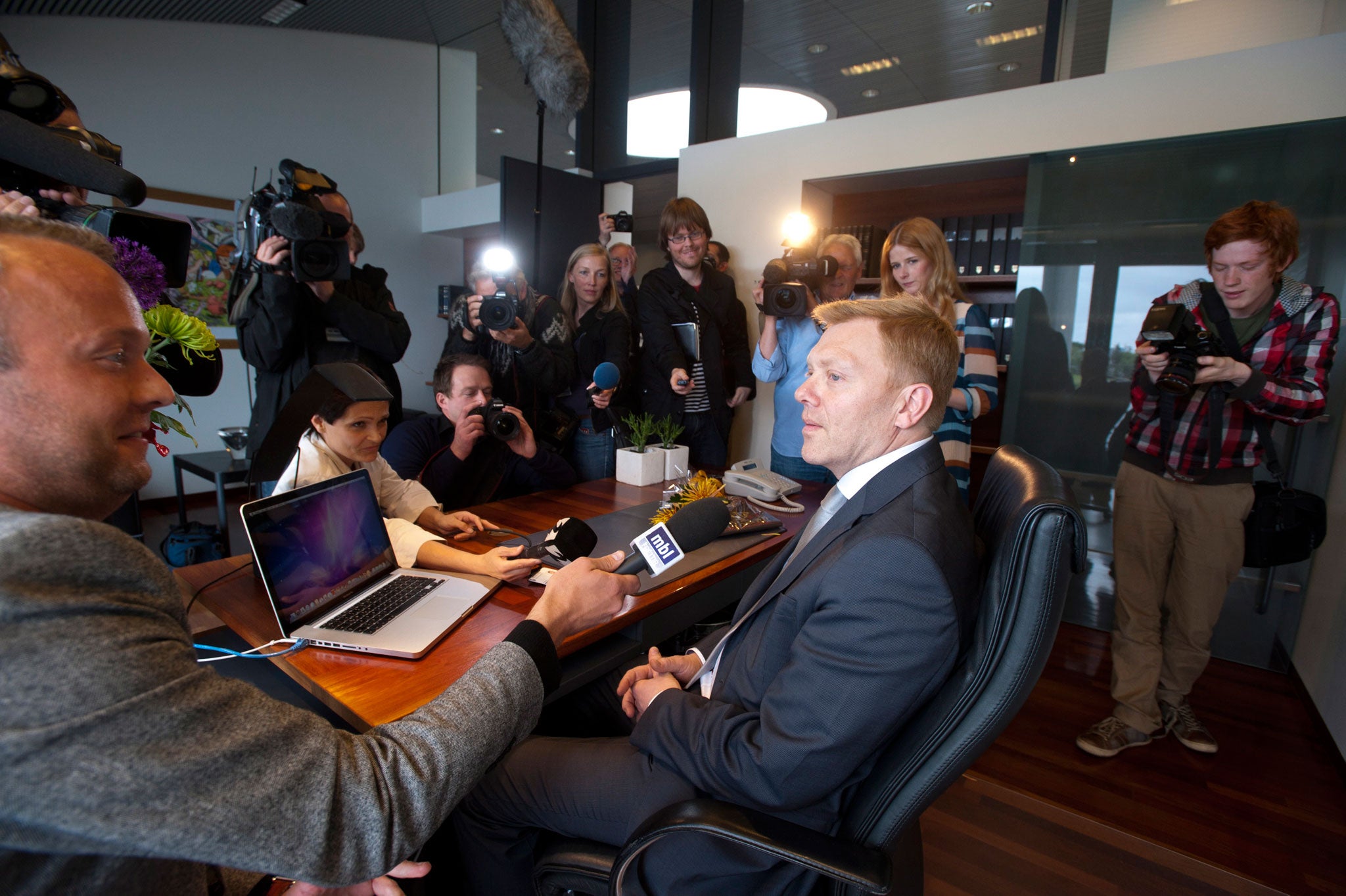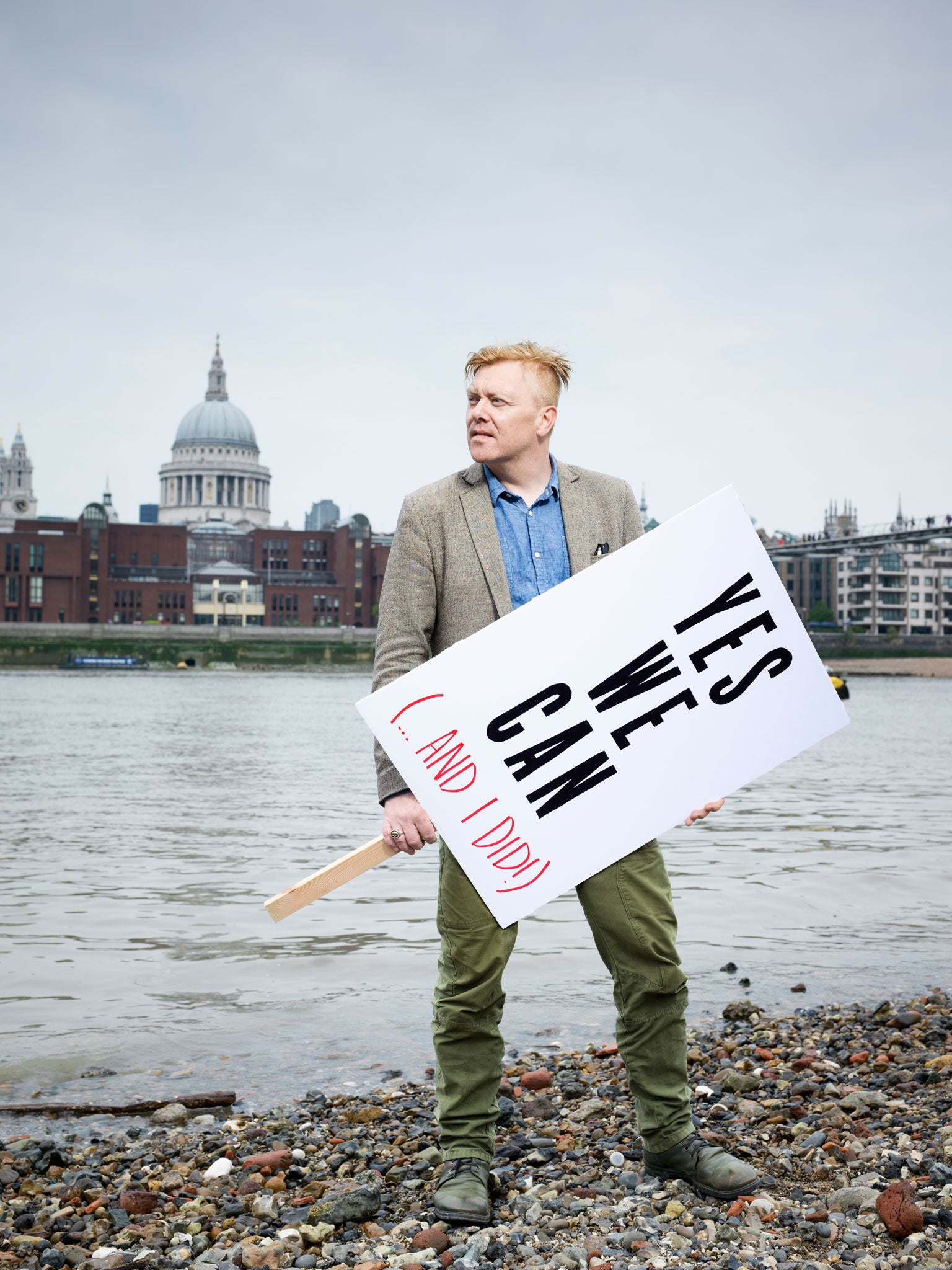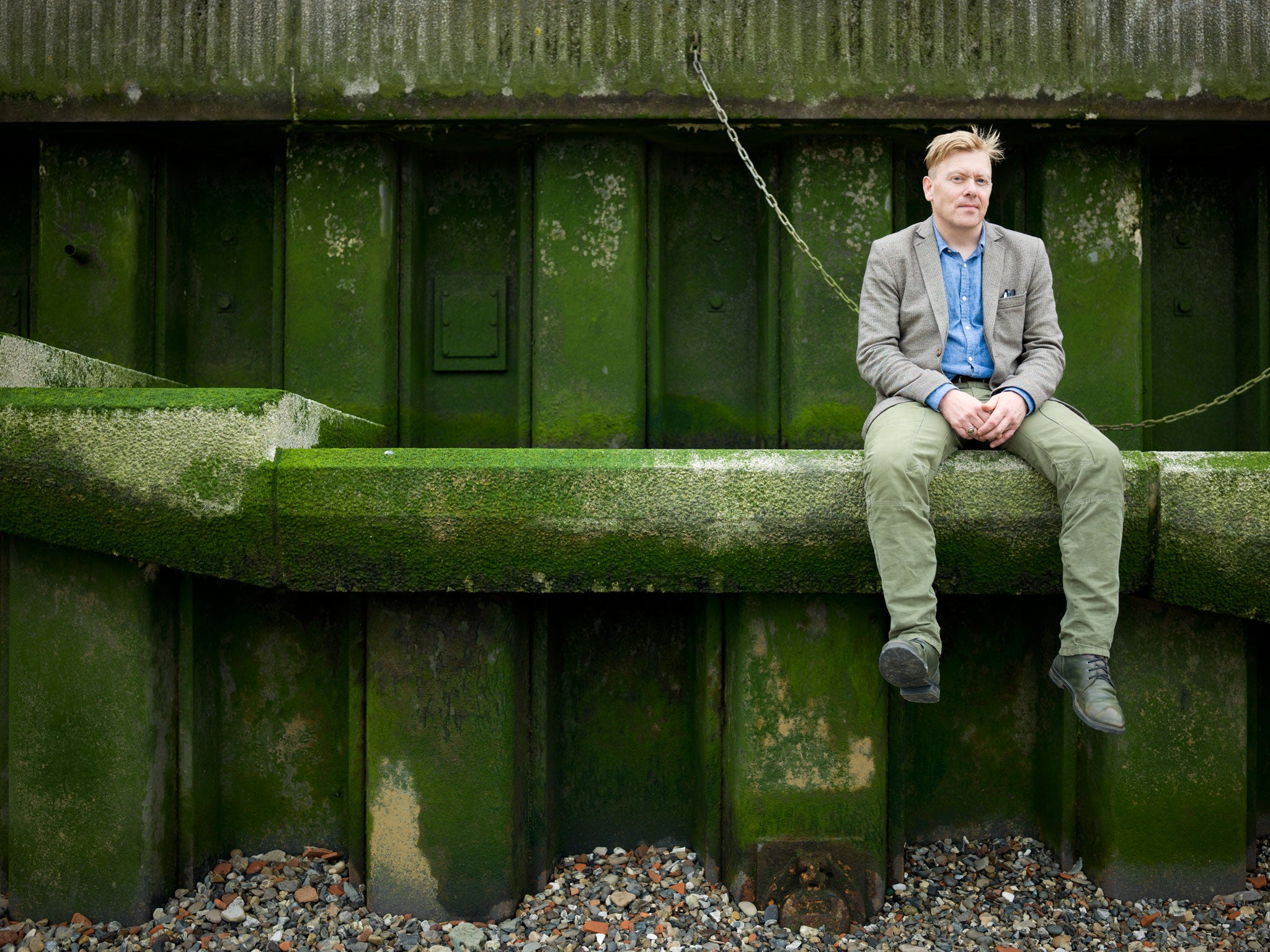Have you heard the one about Jon Gnarr, the comedian who saved Iceland from political and financial catastrophe?
He was an uneducated, anarchic comedian fed up with politicians. So he took them on. And won. Could the 'clown' who saved Reykjavik now provide the rest of the world with a manifesto for a better life?

Your support helps us to tell the story
From reproductive rights to climate change to Big Tech, The Independent is on the ground when the story is developing. Whether it's investigating the financials of Elon Musk's pro-Trump PAC or producing our latest documentary, 'The A Word', which shines a light on the American women fighting for reproductive rights, we know how important it is to parse out the facts from the messaging.
At such a critical moment in US history, we need reporters on the ground. Your donation allows us to keep sending journalists to speak to both sides of the story.
The Independent is trusted by Americans across the entire political spectrum. And unlike many other quality news outlets, we choose not to lock Americans out of our reporting and analysis with paywalls. We believe quality journalism should be available to everyone, paid for by those who can afford it.
Your support makes all the difference.I wasn't sure if I had understood Jon Gnarr's sense of humour. His book, Gnarr!: How I Became the Mayor of a Large City in Iceland and Changed the World, says his Best Party started as a comedy sketch, but it has some quite strict rules, including no smoking or drinking, and some terribly earnest reflections on "responsibility".
Meeting him in person, though, I realise that the Icelandic sense of humour is as dry as subzero ice. He is childishly delighted that I thought the no smoking or drinking rule might be serious. He had had a similar problem with the German translation of his book. "The translator called me. She was translating the 10 values of the Best Party and she said, 'The 10 values are actually 12.'" Gnarr acts out the conversation:
"Yeah, yeah, there are supposed to be 12."
"Oh. OK, I get it. But did you know that 'Honesty' is there twice? It's value number three and number nine."
"Yes, that's how it's supposed to be."
Gnarr, whose first name is pronounced Yon and the rest of whose name is a complex subject to which we shall return, is a comedian who set up a political party, the aforementioned Best Party, which promised to break its promises and led to Gnarr's election as mayor of Reykjavik, Iceland's capital city. He served as the mayor for four years, until this summer, then wrote his book, and is now working out what to do next.
His is an extraordinary story, and what he calls his "intervention" in politics should be studied by anyone far beyond Iceland who shares the feeling that there is something wrong with modern democracy.
The Best Party has now disbanded. It was a "surprise party, not a political party", says Gnarr. Many of its members – anyone could call themselves a member – have set up a more conventional party called Bright Future, which has gone into coalition with the Social Democrats, Iceland's main left-wing party, in the city's government.
It was pretty much a one-man band. When I ask him about his legacy, he stops to correct himself. "I – uh, well, we, because I don't like to take all the credit – completely changed the financial situation of the city. Completely. Financial experts agree it was a miracle. Reykjavik could so easily have gone the way of Detroit – because of the financial crisis and because of Reykjavik Energy, which had huge debts, and all the debts were in foreign currencies."

The party that started as a joke, led by a "clown", restored the city's finances after the collapse of Iceland's banks, and also left a less tangible legacy in that, Gnarr claims, politicians in Iceland are now more polite and more respectful towards each other.
Possibly, this is because he is more serious than other clowns who have gone into politics – Boris Johnson in London, Beppe Grillo in Italy and the Pirate Party in Berlin come to mind. I mention that he uses the word "responsibility" a lot in his book. "Just because I'm funny doesn't mean you can't be serious," the 47-year-old replies. "I'm funny, I try to be funny, except when it's impossible. If people are never funny, then they are just worried, they are depressed. They are confusing depression with seriousness."
He recounts how, as the opinion polls showed the Best Party gaining support in the election campaign, he had to deal with journalists who accused him of being a fool who didn't take things seriously. He would say: "Come on, I've raised five children, I've buried both my parents, I wasn't laughing about that. The kids turned out OK. I can be serious when it's needed, but it's not needed now, not with you."
You can see why he was popular. What is surprising is that he stayed popular after the unenviable task of balancing the city's books. He had to put up electricity prices and merge schools in places with falling pupil numbers. Yet his collaborative style meant that most people accepted that hard decisions were needed. He also admits with a laugh that it helped that he wasn't around for too long. Now that he has stood down, he is no longer a threat to established politicians, so they can afford to say nice things about him.
Another factor might be that Reykjavik is so small – a city the size of Gloucester in a country with the same population, about 325,000, as Coventry. More than a third of Icelanders live in the capital, so he was almost "mayor of Iceland", as Björk called him. And Björk is, of course, a friend of Gnarr's wife, Joga.
That might make the Best Party's success hard to repeat in bigger places. Surely the voters need to know what sort of direction you might go in, and aren't Left/Right labels useful for that? Gnarr refuses to accept my assumptions. He compares the Best Party to a social worker intervening in a family: "You try not to take sides with family members." He says: "Most political parties, except perhaps for fascists, have nice, intelligent, good people in them."

Of course his party was bound to be seen as part of the Left, albeit its anarchic, libertarian wing, and that is where the successor party has ended up. But Gnarr is not just anti-establishment. He recalls the Leftist riots in Reykjavik as the financial crisis closed in and says that although he sympathised with the rioters, he sympathised with the riot police, too. His father was a police officer, and he has an instinctive impatience with those who simply want to tear things down. He has no patience either with some of the main tenets of the Social Democrats, and opposes Iceland's membership of Nato – "It's ridiculous, we don't have armed forces, why should we be part of it?"
At this point it is possible that I might have mentioned the war. The second British Icelandic cod war of the 1970s, that is, which drew this response from Gnarr: "Well, we were in Nato at the time and they didn't do anything to help us. Britain sent all its military ships, and Nato said, 'Oh, we're busy.' It didn't make a difference then that we were in Nato."
But what if you were threatened by someone less benign than us British? "Then Nato will help us." So shouldn't you be a member of it? "No."
Should Iceland be a member of the European Union, then (the country is in accession talks)? A referendum on the subject has recently been postponed because the government feared losing it. He pauses: "I honestly have to say…" another pause for effect "…that I don't care." Another gale of Viking laughter.
This was something for which I was not prepared. After Heath, Wilson, Thatcher, Major, Maastricht, Lisbon, Ukip, David Cameron and Douglas Carswell, here was a political leader in a country outside the EU saying that none of it mattered.
"I really don't care. I don't care whether we join the EU or not. It wouldn't change anything. We are indirectly part of the EU through the EEA [European Economic Area] and Schengen [the passport-free agreement]. So it wouldn't make any difference. That is something social democrats care about. The whole ideology of a united Europe. I don't share that. I just don't care."
But there are many things about which Gnarr does care, deeply and seriously. As an unteachable child, written off as a nobody, he is on the side of the underdog. And, although he became a punk at the age of 13, he has always abhorred violence. "As a child, I suffered from domestic violence for years, in the form of psychological abuse from my father, and I would never agree to inflict it on others," he writes in his book.
He refuses to use the name derived from his father, Kristinsson, but is not allowed to disown it formally. He was allowed to change his middle name from Gunnar to how his mother used to pronounce it, but rails against the unfairness of the Icelandic naming system. Iceland used to be a Danish colony, he explains, and so the ruling class had "fancy Danish last names", which they were allowed to keep, whereas the common people have to take their last name from their father's first name (occasionally their mother's), with a -sson or -dottir suffix.

What form did his father's psychological abuse take, I ask. "He was not a bad person. He was born in hardship in a turf house in 1918. He had to work for his food from the age of six. He carried this pain within him." Gnarr recounts an episode from when he was 12 as if it were yesterday. He had used one of his father's pencils to do a painting.
A few days later, his father confronted him with the paint-covered pencil. "He looked me straight in the eyes and said, 'You've ruined my pencil. Now I can never use it again.'" Gnarr imitates himself as a boy, puzzled and scared. "I said I was very sorry. He said, 'It was one of my favourite pencils.' I was terrified of this man. He made me feel that I was the cause of his pain. I was so nervous that I started laughing. He was very disappointed. He didn't speak to me for many days." His mother persuaded him to apologise again. "I said I was sorry and he cried. He held my hand and he cried."
Gnarr says: "I have tried to not pass my things on to my children." He is proud that his 27-year-old son texted him recently to congratulate him on winning the Lennon-Ono Grant for Peace award this year. His son said: "Congratulations, you deserve it Dad. I've known you for 27 years and I've never known you for anything else than peace."
The humour, the subversion and the silliness are part of Gnarr's appeal. But the reason the Best Party sustained a successful full term of government in Reykjavik is that it was a tool for his essential seriousness of purpose. And, as we are saying goodbye, he says something lightly that is deadly serious. "We are occupying a space that might otherwise be occupied by fascists."
That's me, defender of representative democracy as we know it, well told.
'Gnarr: How I Became the Mayor of a Large City in Iceland and Changed the World' is published by Melville House, priced £16.99
Do-it-yourself democracy: a manifesto by Jon Gnarr
1. Send in the clowns
“Without a robust sense of humour, I’d probably be in an asylum right now. If you don’t have a sense of humour, you’ve got problems. It is as vital as emotional intelligence but it’s often derided. So, to be one step ahead, you’ll need humour.”
2. Participate
“You don’t need to be a politician to have the right to participate in political life. You don’t need special training or any special skills. We’ve neglected democracy, we haven’t been paying attention and we’ve let ourselves get taken for a ride.”
3. Have fun
“As soon as something is no longer fun, it’s worthless, pointless and sick. That’s what’s happened with politics. We’re so focused on success that we’ve forgotten how to enjoy things. It’s high time we got involved because we want to have fun.”
4. Become an anarchist
“Anarchy and peace, that’s what I long for. Anarchy is the only way to a classless society, a mutually supportive society that respects the freedom of the individual. But this must be peaceful: violence is the dark side of human coexistence.”
5. Think slowly
“To save democracy, politics must attract a wider range of people. We need scientists, punks, artists, ordinary people who think slowly rather than quickly; shy people, stutterers, the overweight and the disabled. Above all, young people.”
6. Take responsibility
“It’s pretty simple – you need a little imagination and some courage, and the rest follows. What bugs you? What’s wrong? Found your own political party or join one you respect and lend a hand. But be prepared to invest a bit of time and make sacrifices.”
7. Keep it simple
“During the Reykjavik elections, the main parties took out glossy adverts in the main newspapers. The slogans were devised by advertising agencies, the usual blah-blah-blah about home, garden, and family. Our advert appeared in the classified section of a greasy rag: ‘The Best Party is looking for men and women who want to change things.’ We were almost overwhelmed by the number of replies.”
8. Watch ‘The Wire’
“What else are you going to talk about with your coalition partners – socialism?”
9. Give peace a chance
“I’ve set myself the goal of making Reykjavik the ‘City of Peace’. It depends on every individual. You can’t be working for a peace camp in the Middle East during the day and then in the evening have an argument with your family over the phone.”
10. Make your city hip and cool!
“What is hip and cool? Roughly the opposite of stupid and narrow-minded.”
Join our commenting forum
Join thought-provoking conversations, follow other Independent readers and see their replies
Comments